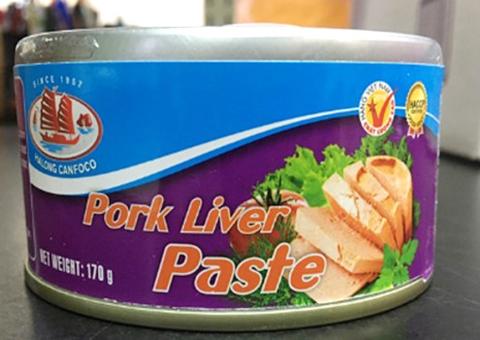To keep African swine fever at bay, Taiwan has banned imports of canned pork products from Vietnam, after a can of food from the Southeast Asian country tested positive for the virus earlier this month, the Council of Agriculture said yesterday.
The council made the announcement at a news conference in Taipei after a meeting of the Central Emergency Operation Center for preventing swine fever.
The council on Dec. 9 confirmed that a can of pig liver paste from Vietnam tested positive for the virus and immediately informed the Ministry of Health and Welfare, Council of Agriculture Minister Chen Chi-chung (陳吉仲) said, adding that it was one of 15 products tested.

Photo courtesy of the Bureau of Animal and Plant Health Inspection and Quarantine
As canned foods are disinfected at high temperatures, the risk of transmitting the virus is very low, he said.
However, even when the virus is killed during disinfection, its nucleic acid can still be detected in a product, said Tsai Shu-chen (蔡淑貞), director of the Food and Drug Administration’s (FDA) Food Safety Division.
The ban on imports of canned pork products from Vietnam was put in place on Tuesday last week, after the FDA completed the relevant paperwork and informed affected businesses, she said.
As of Wednesday last week, the FDA had recalled 529 cans of the product, mainly for consumers’ peace of mind, instead of concern over food security or disease transmission, she said.
Since China reported its first outbreak of African swine fever in August last year, the disease has spread to 10 other Asian countries — Cambodia, Indonesia, Laos, Mongolia, Myanmar, North Korea, the Philippines, South Korea, East Timor and Vietnam — as well as Africa and Europe, council data showed.
As the Lunar New Year holiday is next month, officials have increased inspections at ports and international airports to ensure that officials check inbound luggage and parcels to prevent illegal imports of pork, Chen said.
People caught attempting to carry banned pork products through customs would face a fine of NT$200,000 (US$6,622) for a first offense and NT$1 million for repeat offenses. Foreigners who fail to pay the fine at customs would not be allowed into Taiwan.
From Dec. 13, e-commerce platforms have been required to add warnings for foreign meat products and check if those products have undergone necessary quarantine procedures, the council said, adding that they face a fine of NT$30,000 to NT$150,000 if caught breaching regulations.

Right-wing political scientist Laura Fernandez on Sunday won Costa Rica’s presidential election by a landslide, after promising to crack down on rising violence linked to the cocaine trade. Fernandez’s nearest rival, economist Alvaro Ramos, conceded defeat as results showed the ruling party far exceeding the threshold of 40 percent needed to avoid a runoff. With 94 percent of polling stations counted, the political heir of outgoing Costa Rican President Rodrigo Chaves had captured 48.3 percent of the vote compared with Ramos’ 33.4 percent, the Supreme Electoral Tribunal said. As soon as the first results were announced, members of Fernandez’s Sovereign People’s Party

MORE RESPONSIBILITY: Draftees would be expected to fight alongside professional soldiers, likely requiring the transformation of some training brigades into combat units The armed forces are to start incorporating new conscripts into combined arms brigades this year to enhance combat readiness, the Executive Yuan’s latest policy report said. The new policy would affect Taiwanese men entering the military for their compulsory service, which was extended to one year under reforms by then-president Tsai Ing-wen (蔡英文) in 2022. The conscripts would be trained to operate machine guns, uncrewed aerial vehicles, anti-tank guided missile launchers and Stinger air defense systems, the report said, adding that the basic training would be lengthened to eight weeks. After basic training, conscripts would be sorted into infantry battalions that would take

GROWING AMBITIONS: The scale and tempo of the operations show that the Strait has become the core theater for China to expand its security interests, the report said Chinese military aircraft incursions around Taiwan have surged nearly 15-fold over the past five years, according to a report released yesterday by the Democratic Progressive Party’s (DPP) Department of China Affairs. Sorties in the Taiwan Strait were previously irregular, totaling 380 in 2020, but have since evolved into routine operations, the report showed. “This demonstrates that the Taiwan Strait has become both the starting point and testing ground for Beijing’s expansionist ambitions,” it said. Driven by military expansionism, China is systematically pursuing actions aimed at altering the regional “status quo,” the department said, adding that Taiwan represents the most critical link in China’s

‘REALLY PROUD’: Nvidia would not be possible without Taiwan, Huang said, adding that TSMC would be increasing its capacity by 100 percent Nvidia Corp CEO Jensen Huang (黃仁勳) on Saturday praised and lightly cajoled his major Taiwanese suppliers to produce more to help power strong demand for artificial intelligence (AI), capping a visit to the country of his birth, where he has been mobbed by adoring fans at every step. Speaking at an impromptu press conference in the rain outside a Taipei restaurant, where he had hosted suppliers for a “trillion-dollar dinner,” named after the market capitalization of those firms attending, Huang said this would be another good year for business. “TSMC needs to work very hard this year because I need a lot